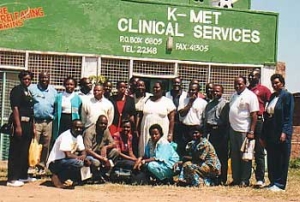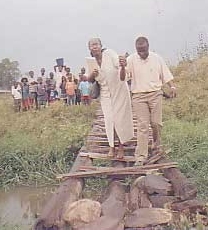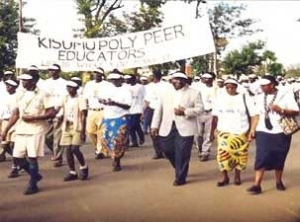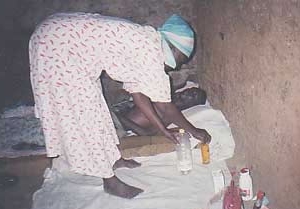Kisumu Medical and Education Trust of Kenya
Education is a key goal of the Kisumu Medical and Education Trust (KMET) in Kenya, which was registered in 1995 as part of the Trustees Act. This non-governmental organization (NGO) has a goal to upgrade the health standards of Western Kenya, a region with the poorest such standards in the country.
Aiding the Region

The KMET project is located in West Kolwa, which as of 1999, contained about 85,000 people in almost 20,000 households. Home-based care activities began in 2002.
The program has trained many youth peer educators, who teach others about HIV/AIDS. Educating women and girls is especially important, since they bear the burden of HIV/AIDS and suffer from inadequate access to reproductive health services. Occupational training for hair dressers, tailors and caterers is also taught. Some girls from slum areas are recruited to be trained as peer educators. Safe sex measures, avoiding sexual abuse and exploitation, unsafe abortion and family planning are taught to avoid disease and teenage pregnancy.
KMET workers make sure to empower the community. They involve them in family planning, community-based service providers, distribute contraceptives and educate the community. Certified home workers are provided with drug kits and are educated in drug kit management, basic nutrition, and other areas. They also counsel patients. Nutritional programs are also run.
Improving Nutrition

The nutrition program goals are to process and distribute Nutri-meal supplements, train workers, conduct community mobilization and sensitization sessions, strengthen access to nutrition supplements by initiating community Nutri-care kiosks, strengthen household food security activities in the community, and facilitate community feeding support. Community counseling and home visits are conducted.
Some of their achievements include training 140 community health workers in nutrition and food security and equipping them with nutrition support kits, reaching more then 20,000 households with supplements, supporting school feeding so that more than 1,500 orphans can go back to school, and establishing Nutri-care kiosks. Due to malnutrition, many cannot tolerate medicine.
Preventing Maternal Mortality

Another program is called the Kenya Prevention of Maternal Mortality (KPMM), with headquarters in Accra, Ghana, at the Regional Prevention of Maternal Mortality (RPMMN). Maternal mortality is influenced by genetics, education, facilities, and culture. Team members include obstetricians/gynecologists, nurse/midwives, social scientists, community physicians, ministry of health workers, investors, and educators.
The goals of KPMM include strengthening the capacity of Kenyan institutions to design, implement, and evaluate maternal health programs in a variety of setting. They also aim to identify and bring together professionals in reproductive health, develop programs and operations research models for maternal mortality prevention projects, and to inform decision makers about the serious implications of maternal mortality and share information on effective strategies to reduce it.
Helping Youth
Youth centers include recreation to help children grow and find healthy, creative interests. Drama, sports, poetry, and photography are some of the programs offered.
These centers serve as creative and expressive avenues, and can be used with stories to teach sexual and other topics.
Improving Reproductive Health
Reproductive health education involves identifying gaps in services and making available information about local resources, education and training. This program also develops community and professional networks, and ensures project sustainability. Methods of training include discussion groups, videos, role plays, lectures and, of course, books. Market outreaches, such as networking with primary schools, have been conducted. Pre-tests and post-tests measure graduate knowledge.
KMET also trains nurse midwives and physicians. Challenges include financing and some local illiteracy, lacked of trained personnel, and local customs. For instance, sex continues to be looked at as a cleansing ritual. Polygamy persists, and many men refuse to use condoms.
Post-abortion care is also taught. About 96% of abortions in Africa are performed unsafely. Most women who have unsafe abortions are single, unemployed students. Methods include douches, plant stems, herbal teas, ground glass gulped as powder and excessive alcohol. The KMET program uses worker training and providing contraceptives.
Working with Partners

KMET works with other groups such as the US Centers for Disease Control and Prevention and African groups such as the APHIA II-Nyanza Project and Tuungane Project to supply materials for programs. KMET also receives microloan support through Kiva. Women gain not only knowledge but confidence. Benigna Aoko, 20 years old, said that "I have been empowered to empower other girls in the community" ad that she has "gained in personality" to be able to speak in front of people.
Providing Economic Support
Although KMET does not provide large stipends as other NGOs do, loans are provided because economic empowerment is needed in addition to education. Lonas are especially geared to single mothers and orphans.
The KMET revolving loans make an important difference for people in Kenya, especially those affected by the deaths of loved ones. One such person is widowed Yuanitta, whose husband died of AIDS and who was left with 12 children to care for. The loan enabled her to open a small stall at a local market. She also receives the nutrition supplement babuji.
About the Author
Louiza Patsis, MS, is the author of the children's book The Boy in a Wheelchair and the adult books Life, Work and Play: Poems and Short Stories, and Pocket Guide to Fitness. These books are available on www.Authorhouse.com, www.Amazon.com and www.bn.com.
About Angels in Medicine
Angels in Medicine is a volunteer site dedicated to the humanitarians, heroes, angels, and bodhisattvas of medicine. The site features physicians, nurses, physician assistants and other healthcare workers and volunteers who reach people without the resources or opportunities for quality care, such as teens, the poor, the incarcerated, the elderly, or those living in poor or war-torn regions. Read their stories at www.medangel.org.